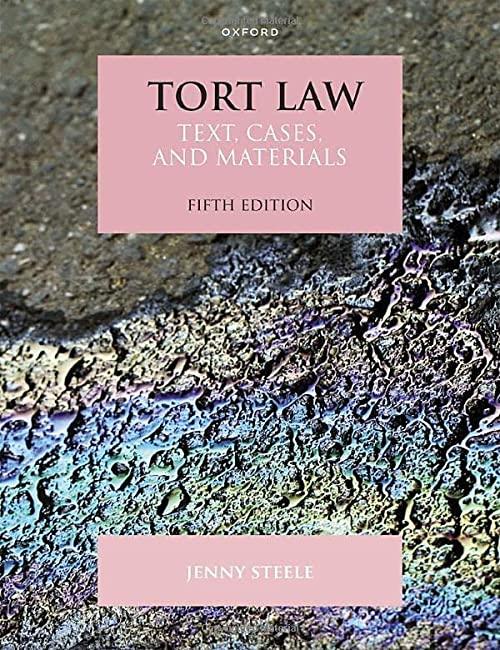Answered step by step
Verified Expert Solution
Question
1 Approved Answer
IV. FALSE IMPRISONMENT A. Definition: False imprisonment is defined as the intentional infliction of a confinement. [17] Example: D wants to have sex with P,
IV. FALSE IMPRISONMENT A. Definition: False imprisonment is defined as the intentional infliction of a confinement. [17] Example: D wants to have sex with P, and locks her in his bedroom for two hours hoping that P will agree. She does not, and D lets her go. This is false imprisonment, because D has intentionally confined P for a substantial time. B. Intent: P must show that D either intended to confine him, or at least that D knew with substantial certainty that P would be confined by D's actions. The tort of false imprisonment cannot be committed merely by negligent or reckless acts. (Example: D, a shopkeeper, negligently locks the store while P, a customer, is in the bathroom. This is not false imprisonment, since D did not intend to confine P.) [17] C. "Confinement": The idea of confinement is that P is held within certain limits, not that she is prevented from entering certain places. (Example: D refuses to allow P to return to her own home. This is not false imprisonment - P can go anywhere else, so she has not been "confined.") [17 - 18] D. Means used: The imprisonment may be carried out by direct physical means, but also by threats or by the assertion of legal authority. [18 - 20] 1. Threats: Thus if D threatens to use force if P tries to escape, the requisite confinement exists. [18 - 19] 2. Assertion of legal authority: Also, confinement may be caused by D's assertion that he has legal authority to confine P - this is true even if D does not in fact have the legal authority, so long as P reasonably believed that D does, or is in doubt about whether D does. (Example: Storekeeper suspects P of shoplifting, and says, "I hereby make a citizen's arrest of you." Putting aside whether Storekeeper has a privilege to act this way, Storekeeper has "confined" P, if a reasonable person in P's position would think that Storekeeper had the authority to make such an arrest, even if under local law Storekeeper did not have that authority.) [19] E. P must know of confinement: P must either be aware of the confinement, or must suffer some actual harm. (Example: P is locked in her hotel room by D, but P is asleep for the entire three-hour period, and learns only later that the door was locked. This is probably not false imprisonment.) [21] Analyze the following, applying facts to the law Hypothetical facts: Malcolm Harberry is the manager of the Soft Touch, a ladies' clothing store. Madge Strident, a customer, was looking at accessory jewelry next to the full-length mirrors. Malcolm glanced at the mirrors and thought he saw Madge place something in her purse. He thought it might be jewelry, but did not actually see the object. As Madge began to exit the store, Malcolm asked her politely to stop. She did so, whereupon Malcolm identified himself and requested that she accompany him to the back room for questioning. She refused. Malcolm insisted, threatening to telephone the police if she attempted to leave the store. She then agreed and the two went to a small room at the rear of the store. Inside, Malcolm asked Madge to empty her pockets and purse, which she did. No jewelry was found. He asked her a few question about the jewelry and what he had seen. She explained that she had put a handkerchief into her purse, and there was in fact a handkerchief inside it Malcolm apologized for any inconvenience and Madge then left. The interview in the room lasted five minutes
Step by Step Solution
There are 3 Steps involved in it
Step: 1

Get Instant Access to Expert-Tailored Solutions
See step-by-step solutions with expert insights and AI powered tools for academic success
Step: 2

Step: 3

Ace Your Homework with AI
Get the answers you need in no time with our AI-driven, step-by-step assistance
Get Started


